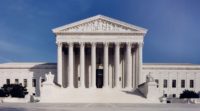The U.S. Supreme Court ruled June 1 that the International Brotherhood of Teamsters must defend itself in court over allegations that a 2017 drivers strike in Washington state damaged a concrete supplier when trucks were left with full loads as the strike was called.
While CalPortland, the concrete supplier, and construction groups applauded the 8-1 ruling, labor unions insist it will change nothing in construction law.
“Although we’re disappointed in today’s result, the Court’s opinion leaves intact both the federally protected right to strike and the basic framework for determining when labor disputes should be decided by the National Labor Relations Board instead of state courts," said Darin M. Dalmat, senior partner at Barnard Iglitzin & Lavitt, the law firm that represented the Teamsters in the case, in a statement.
Glacier Northwest Inc., a division of CalPortland, employs truck drivers that are members of Teamsters Local No. 174. After a collective-bargaining agreement with Glacier expired in 2017, the union called for a work stoppage on a morning it knew the company was in the midst of mixing substantial amounts of concrete, loading batches into ready-mix trucks and making deliveries.
The union directed drivers to ignore Glacier’s instructions to finish deliveries in progress. At least 16 drivers who had already set out for deliveries returned with fully loaded trucks and some even stopped where they were and left their trucks on roadsides. By initiating emergency procedures to offload the concrete into environmentally safe catch basins, Glacier prevented significant damage to its trucks, but all the concrete mixed that day cured and became useless.
Glacier sued the union for damages in state court, claiming that the union intentionally destroyed the company’s concrete. The union moved to dismiss Glacier’s claims, arguing that the National Labor Relations Act preempted the lawsuit and protected a union's right to strike.
Teamsters: Conduct Was Protected
In the Teamsters' view, the law protected the drivers’ conduct. The trial court agreed with the union, but the appellate court reversed that decision and the Washington Supreme Court reinstated the trial court’s decision, which set it up for the Supreme Court decision that sent it back to the trial court.
Union actions not only resulted in the destruction of all the concrete Glacier had prepared that day; "they also posed a risk of foreseeable, aggravated, and imminent harm to Glacier’s trucks," the court said.
Writing for the majority to send the case back to trial court, Associate Justice Amy Coney Barrett said: "Because the union took affirmative steps to endanger Glacier’s property rather than reasonable precautions to mitigate that risk, the law does not arguably protect its conduct," Associate Justice Ketanji Brown Jackson was the only dissenting justice, with all others concurring with the majority.
Construction groups praised the decision, particularly the Associated Builders and Contractors of America, which represents mainly non-union contractors.
“The precedent is clear that the National Labor Relations Act does not give unions a free pass to intentionally destroy an employer’s property during a labor dispute,” said Ben Brubeck, ABC vice president of regulatory, labor and state affairs, in a statement. The Washington Supreme Court decision "left employers without a remedy for the intentional destruction of their private property, causing businesses, workers and communities to suffer."
Brubeck's statement added that intentionally destroying another person’s property should not and cannot be the norm in the construction community.
While agreeing with the decision in principle, the Associated General Contractors of America acknowledged that there were differences between the hastily-called Washington state strike and general labor actions by unions against their contractor employers.
"This decision will have no impact on the National Labor Relations Act and how it governs the relationship between employers and unions, including the protections in place for employees’ right to organize and engage in legal labor disputes." said Brian Turmail, AGC vice president. "However, it does reaffirm that union officials cannot knowingly engage in deliberate acts of sabotage as part of a labor dispute, as 8 of the 9 justices rightly concluded."
Employer: Property Rights Prevailed
CalPortland Co., the owner of Glacier Northwest, said that it was only protecting its property rights in what it called an unprecedented labor dispute.
“CalPortland is very pleased with today’s 8-1 decision by the United States Supreme Court in the case ..." said Robert M. Binam, its senior vice president and general counsel, in a statement. "The decision confirms the well-established legal principle that a labor union cannot take affirmative steps to endanger or destroy an employer’s property in furtherance of a strike, and then claim such tortious acts are somehow protected by the National Labor Relations Act."
Both Justice Jackson in dissent, and Associate Justice Clarence Thomas in concurrence, drew attention to a 1959 precedent, San Diego Building Trades Council v. Garmon. That decision had the effect of giving the National Labor Relations Board a benefit of the doubt that other federal agencies do not usually receive from the high court.
While federal law generally preempts state law when the two conflict, in Garmon, the Supreme Court ruled that the federal law preempts state law if the two even arguably conflict—a type of deference as to the labor board’s presumed jurisdiction. Jackson wrote that Congress had chosen to entrust broad power to the board given its specialized expertise.
The decision in Glacier denying that special deference could apply to other debates over how much deference courts should accord government agencies.
"Six years ago, this company forced us out on strike by refusing to bargain in good faith, and [it has] been coming after us in court ever since," said CalPortland driver Mark Hislop in a statement released by Teamsters Local 174. "As far as I’m concerned, today’s decision changes nothing for us Teamsters, and it will not stop us from fighting as hard as we can for strong contracts."
For Glacier Northwest and CalPortland drivers, the fight over contracts continues. As recently as last August, more than 100 Local 174 drivers walked off the job in another contract dispute with CalPortland and other suppliers.





Post a comment to this article
Report Abusive Comment